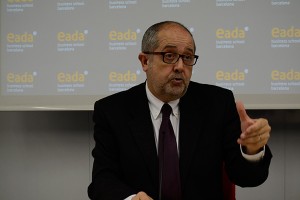Secretary Felip Puig analyzes the Catalan economy's challenges in EADA
 On Thursday 20th of February the secretary for Companies and Employment of the Generalitat de Catalunya, Felip Puig, gave a lecture in EADA under the heading “New times for the productive economy”.
On Thursday 20th of February the secretary for Companies and Employment of the Generalitat de Catalunya, Felip Puig, gave a lecture in EADA under the heading “New times for the productive economy”.
The event was opened by David Parcerisas, president of the Board of Trustees of EADA Foundation, who stressed the need to recuperate the productive economy in order to be more competitive. “In the past the smell of factories constituted a characteristic feature of cities whereas for young people nowadays this sounds like something out of fiction” explained Mr. Parcerisas. In his opinion “the debate on new times for the productive economy is especially relevant today because what is at stake is not our future but that of our grandchildren”.
STRONG POINTS
In his lecture Felip Puig insisted that Catalonia, despite having reduced its industrial size given the current economic downturn, has resisted thanks to “the diversification of industry, the transfer of knowledge, the bet on innovation and the commitment to social cohesion”. Proof of this, as he pointed out, is that 20% of Catalonia’s GDP today is industry based, in line with the percentage demanded by the European Union. The forecast is to reach 25% by 2020.
Furthermore, the secretary presented other data that bear witness to the Catalan economy’s good health. For example, in recent years, Catalonia has been the European region that has attracted the most investment both in industry and business. In addition to this, it has consolidated itself as a flagship on a European level in sectors with high added value such as the chemical industry –second in Europe after Holland-, the automotive and the biotechnology industries.
And all this without leaving aside the weight of tourism in the Catalan economy, due above all to the increase in the number of cruises which call into the port of Barcelona that is now the first European tourist port and third worldwide.
MAIN CHALLENGES
But globalisation poses new challenges for the Catalan economy. For Mr. Puig one of the priorities is knowledge transfer and the support for innovation, “key to economic development and business creation”. In this respect he pointed out that “although Catalonia has identified strategic sectors it must invest more in R&D&I and SMBs need to establish alliances to jointly generate more knowledge and thus be in a position to compete in foreign markets”. Catalonia currently has 6 advanced technology centres and 84 technology centres, “which leaves us far below the levels of frontline European countries in this area”.
In his presentation the secretary also mentioned the need to redirect Professional Training to the demands of industry and companies. He pointed out that “although we have fewer subsidies, the Generalitat is correcting this problem in order to generate more employment in all the sectors of our economy”.
Other challenges that he mentioned were the future Mediterranean freight corridor, “of great logistic importance for economic development”, a banking union “in order to compete with European companies on the same level”, the urgent lowering of energy costs and, from a tourism point of view, support for large resorts “in order to attract more Asian and American tourists”.
